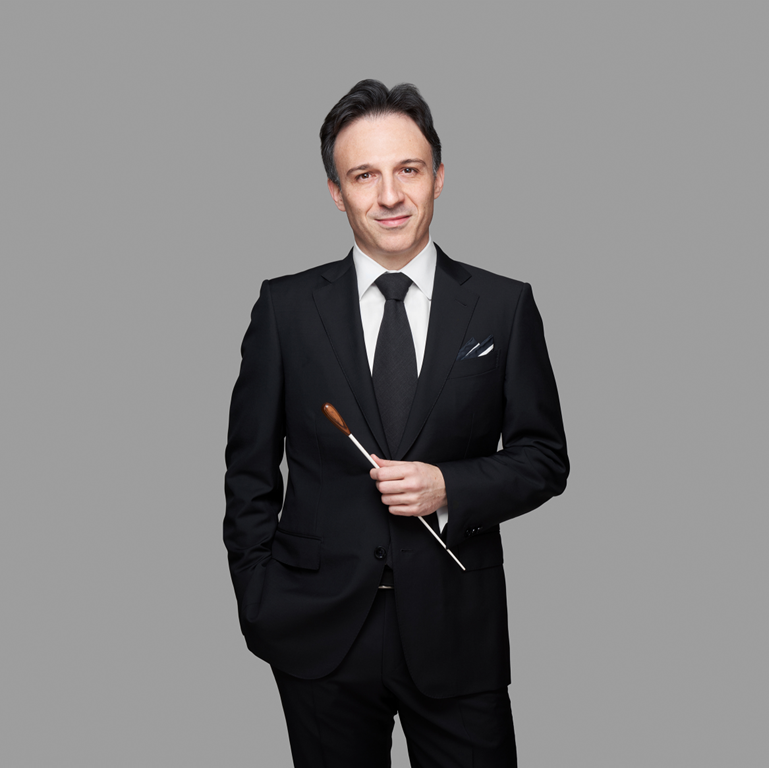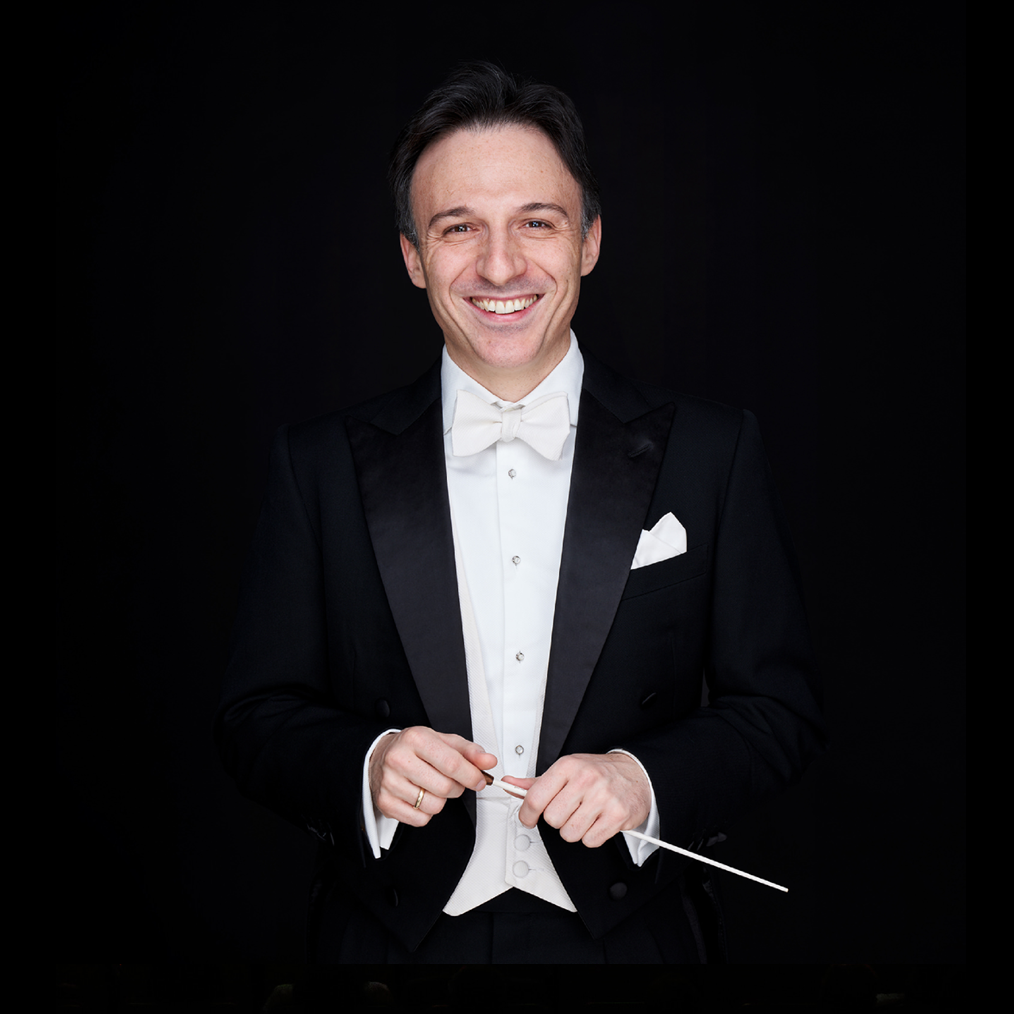
Past Events
Umberto Clerici
Conductor, AYO Autumn Music Camp 2021
Umberto Clerici has a career spanning over 20 years, not only as a gifted cellist but also as an emerging conductor. Growing up in Northern Italy, he has travelled across the globe, performing in prestigious orchestras and as a soloist. He came to Australia following his appointment as Principal Cello of the Sydney Symphony Orchestra and has since pursued work as an artistic director.
Ahead of joining us as conductor of AYO Autumn Music Camp, we chatted to him about his career and the musical wisdom he hopes to pass onto the next generation.

To start off, where did your love of music begin?
I actually come from a family which doesn’t have musicians, they are all in the field of law. My mother wanted my brother and I to have a musical education so she took us to a Suzuki school in the city of Turin, Italy. We started when I was about 4 years old where I had the choice between a violin or a cello – I felt like the violin which my brother played was too full on but I felt more at ease with the cello.
I actually didn’t really have an interest in playing music outside my formal education but when I got to about age 7 or 8, I knew this is what I wanted to do because of the social aspects. I got to go on summer camps with the other kids in the orchestra, play soccer or ping pong, and just felt the sense of community when we played altogether. Social bonding through music definitely kept my love of music alive when I was very young.
How do you compare your experiences performing in Europe and Australia?
When we are talking about performing, there are two sides to it. There are the musicians producing the performance and the audience who listen and enjoy, so of course these two things are interconnected.
I think European audiences have more experience because this kind of music comes from there. In Italy where I’m from, you’d often be impressed by these fans of the opera singers who would wait for them after the show to say “I listened to your singing before and that C-note was very clean”, or “what happened to your voice this evening?”. You’d sometimes get audience members in Germany who would bring a score to concerts to follow along. So this audience is definitely more experienced, but this doesn’t always mean they’re a better audience. Music has to be enjoyed with an open mind and open ears and not always from a professional stance.
Of course, our performing is also influenced by this. I always found here in Australia that we could be braver to express our ideas and opinions. The biggest difference and the reason why I came here is some European countries with long traditions – for example symphonies in Austria and Germany or opera in Italy – tend to be close-minded to new interpretations. For instance, when I studied in Germany and Italy, English music was almost non-existent except for maybe the Elgar Cello Concerto or The Lark Ascending, there were very few landmark pieces. So there was always the closure of always playing the same pieces which audiences are accustomed to. Here in Australia, because we don’t have that tradition yet we’re much more open-minded and the audience will accept any kind of music. Contemporary Australian music has much more space in our programming, whereas contemporary European music is only confined to very specific festivals or events.
“I’m definitely most productive in the evening, mostly because I’m Italian. In the morning I have to drag myself out of bed, make two cappuccinos and then maybe you can talk to me…”

What caused the shift from a cellist to a music director?
It was quite organic but I’ve always been interested in this social interaction within the music that comes out on stage. I always wanted to know where my part in the orchestra related to the others. There was a point where Sydney Symphony Orchestra offered me a private event to conduct at the Opera House and at the beginning, I was very unsure but thought I’d give it a try anyway and all my colleagues were so supportive
It’s actually very rare and feels kind of weird to be in a role like Principal Cello to then shift to a position where you’re telling them what to do. For me conducting is neither an ego projection or a career ambition, but it’s much more the realisation that you can enable the music and the musicians to play together with more consciousness.
Has your career as a cellist made you more understanding and empathetic as a conductor?
100%. Playing in an orchestra for many years in so many different parts of the world, you are not only empathetic, but you know exactly what you feel from the orchestra. Orchestral players are very highly skilled musicians but you have to work as part of a machine, playing different programs every week with usually completely different characteristics. One week you’ll play Baroque, the next you play contemporary, then Mahler, sometimes there’s 20 players and sometimes there’s 150.

Do you think the definition of an ‘orchestral musician’ is changing for the next generation?
I really hope so. I just think these different categories of orchestral musician, chamber musician, solo musician, it’s so wrong – a musician is a musician. Their attitude, their commitment, their will to play with others shouldn’t change. I hope in Australia that everything keeps expanding, so there are more experiences for musicians to play outside an orchestra.
When I’ve conducted professional orchestras I always push everyone, particularly at the back of the string sections, to actually be in the game and to play like they would in a quartet because each of them count.
So, AYO and these younger generations need to have the same attitude, whatever they end up doing in their lives, whether they pursue a career in music or become really good amateur musicians while pursuing medicine or law. Music is a liberal art and therefore it doesn’t matter where you are, or whether you’re playing in a group of 100 or by yourself, your passion and attitude should be the same.
Would you say you’re most productive in the morning or the evening?
Definitely in the evening, mostly because I’m Italian. In the morning I have to drag myself out of bed, make two cappuccinos and then maybe you can talk to me. In the past year especially I used the lockdown to study scores, so while my family were asleep that would be my time to study sometimes until 3 or 4am when everything is dead silent.
It’s funny, coming to morning rehearsals in Italy, everyone would have only just woken up and were basically still in their pyjamas. Whereas when I came to Australia and performed with the SSO, some of my colleagues would come to a 10am rehearsal saying they had swam, surfed, trained for an iron man competition and I’d be standing there with my coffee thinking, ‘I only woke up 20 minutes ago’.
I’d say if you wake up early, you have to keep that level of energy to be on fire for your concert in the evening which is when you need to be at your best.

Where have you had the best food in the world?
I actually think in Australia, food is the most amazing because it’s the only country I know that took all of these influences – Asian, Italian, French – but didn’t adjust it. The only big difference between Australian and Italian dining is that to eat well it’s still an event where you go to a fancy restaurant whereas in Italy it’s very traditional to go out in your small village frequently for an incredible dish cooked by your Nonna.
My favourite dish is this special kind of focaccia from a region in the South of Italy called Apulia. I know it’s my favourite to bring to a dinner. I hope I never become gluten intolerant.
What excites you most about working with the Australian Youth Orchestra in April?
The list is so long. The real question is what wouldn’t excite me?!
I’ve listened to recordings and radio broadcasts and was always really impressed. Considering the number of spots within the conservatoriums and the amount of people within Australia, they are all at an exceptional level. At their age, musicians are in the best instrumental shape because everything is new and exciting and they are so eager to play together.
We’re also playing energetic pieces like Mozart’s Haffner symphony, which was actually a serenade originally, and Prokofiev’s Classical symphony. I want them to notice how the music builds, how it fits into the European context, and what the composer had intended. I’m very excited because with AYO they don’t lack the spark, they just need the guidance to harness all of that youthful energy.
At the end of the day, experience is something that builds naturally but their attitude and wonder to play together is innate.